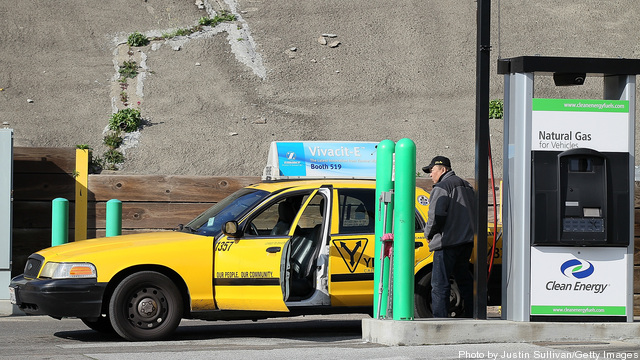
Engine manufacturers, natural gas producers and fuel distributors have been “pushing” the financial and environmental benefits their technology offers, but some industry leaders are now seeing significant “market pull.”
The fuel cost differential that has emerged between natural gas and diesel or gasoline is perhaps the most compelling aspect of the natural gas vehicle business case. Navistar Engine Group President Eric Tech told Breaking Energy that it’s not hard to convince customers to save money.
Engine manufacturer Navistar recently announced a strategic partnership with Clean Energy Fuels, a major supplier. The companies are offering a package deal in which Navistar supplies the trucks and Clean Energy Fuels supplies natural gas to customers as a single product.
Navistar offers engines that run on liquefied natural gas or compressed natural gas, and individual customer requirements inform which to choose. For example, LNG provides superior range – around 400 miles – and can be refueled about as quickly as a diesel tank, but onboard technology is more complicated and thus more expensive than CNG.
While CNG offers a shorter range of closer to 100 miles, this could be sufficient for certain applications like dairy or beverage industry delivery trucks that run routes and return to the same location each night. The CNG refueling technology can also be brought directly to the customer. Refueling takes longer than LNG or diesel, but an onsite fueling facility can provide what’s called a “trickle charge” where the tanks are slowly refilled overnight while the vehicles are not in use.
The Infrastructure Challenge
Natural gas refueling infrastructure has a long way to go before NGVs can refill with the convenience and regularity of traditional liquid fuels. Clean Energy is addressing this issue with plans to construct 150 natural gas fueling facilities over the next few years, many of which will be located at existing Pilot Flying J truck stops. The stations will initially provide LNG and will be equipped to supply CNG at a later date.
Although natural gas refueling facilities come under stricter fire code regulation, Tech has not found compliance to be onerous and told Breaking Energy that as long as all applicable laws are followed, fire codes should not be a hindrance to wider NGV proliferation.
Growing Up Before Our Eyes
Customer acceptance and technological availability are two key market maturity components, says Tech. Navistar is working on the latter, with new trucks coming online this fall and next year. The company works with a sophisticated customer base that understands their operating costs down to the finest detail. Since a majority of these costs are made up of fuel, Navistar and Clean Energy offer contracts that allow companies to lock in their long-term fuel costs.
We’ve been pushing for a long time but I think a tipping point has been reached
Tech sees customers adopting this technology now and estimates NGVs could gain 25% to 40% market penetration in about a decade. “We are definitely in a pull market, we’ve been pushing for a long time but I think a tipping point has been reached,” said Jim Harger, Chief Marketing Officer for Clean Energy Fuels.
How Long Will This Cheap Natural Gas Last?
We often hear about America’s natural gas bounty, which led by shale gas development could supply the US for over 100 years. But some believe that if the country switches to gas for power generation, transportation fuel, manufacturing feedstock and exports LNG, increased demand would drive up prices.
To read more about CNG infrastructural activity on Breaking Energy, click here, and for more on LNG-powered vehicles, infrastructure and the Clean Energy Fuels-Pilot Flying J partnership, click here.
Tech believes the current commodity price dynamic will persist over the long term and does not see a diesel price decrease any time soon. Further, he says even a doubling in the wellhead price of natural gas would only equate to a 10% pump price increase, which would still make natural gas cheaper than diesel or gasoline, given existing market fundamentals.
Some on Wall Street agree. In a recent note, privately-owned brokerage Sterne Agee said, “The move toward natural gas and hybrid engine technology is a game changer for the industry.”
